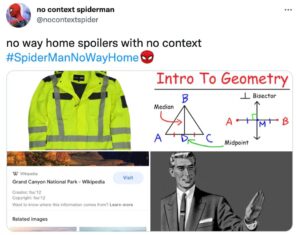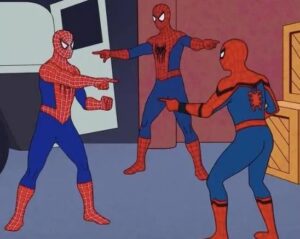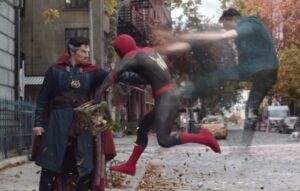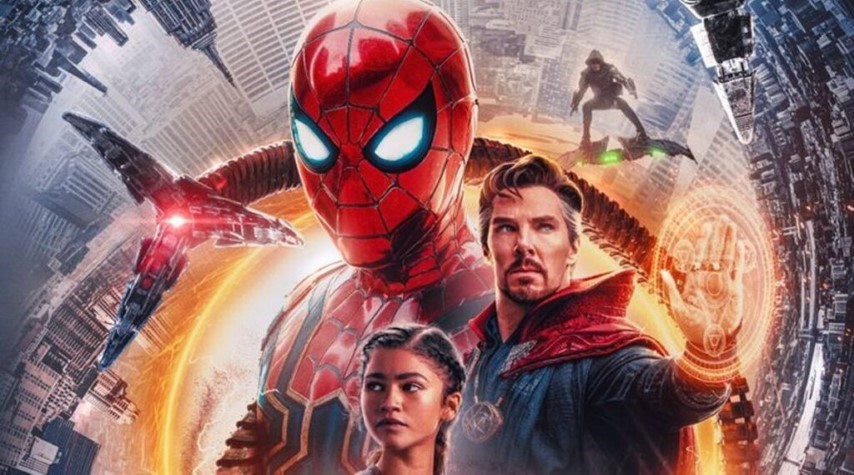A union across time: No way home
Some movies are more anticipated than others, and it’s safe to say that the Marvel Cinematic Universe has built itself a following such that every MCU movie is highly anticipated. So we all shouldn’t be surprised when Spiderman: No Way Home released to gross over $1 billion worldwide, becoming the highest-grossing film of 2021, and the only film to cross $1 billion since COVID-19.
But while the numbers speak for themselves, how much of it is just hype, and how much is genuine storytelling goodness? Let’s get into the nitty gritty!
PS: If you still haven’t watched this, can you even call yourself a fan? But in case you haven’t, SPOILERRRRRRRRRRS

Okay cool, if that didn’t scare you off, let’s get into the nitty gritty.
Starting with the story, I’d be the first one to tell you that the story is, at its core, pretty basic. And the way the plot line neatly turns around to just give everyone a good lesson (it starts with spiderman being a tad selfish, ends up with him willingly sacrificing his memory), yeah, that only happens in stories.
At the core, the plot is a spell (a selfish spell at that, but we’re all familiar with the woes of college kids, so it’s not hard to sympathies) gone wrong, causing chaos until someone is forced to do the very thing they didn’t want to do in the first place. For Peter Parker, that meant erasing the world of his existence. Not just Spiderman’s existence; his. If you feel like this kind of story line is familiar, it’s sort of a Marvel thing.

However, that being set, what stopped this from being just another boring story is how it was executed. Dr. Strange’s spell going haywire was a nice logical setup for bringing in the multiverse, and what really set this story apart was the element of compassion incorporated throughout. Parker’s determination to save people, even villains out to kill him, had to be admired, and even the age old adage “with great power comes great responsibility” was much more meaningful here, with a weight of context and backstory behind it. (Sorry Maguire)
So in conclusion, basic story at the core, but the execution elevated it to a new level.
Going back to the centric plot device, the multiverse; some may say it’s the equivalent of using a nuclear bomb for fireworks, but hey, it worked. The fact that it made logical – or as logical as someone can make a multiverse – sense a plus point. If we’re being honest, the main selling point of the movie was the multiverse, and the multi spidermen. If we had to summarise the second half of the movie, it would be this:

Yup, that’s pretty much it. However, we have to admit that this moment was a real emotional moment for most of us, with fans in the theatre openly cheering, and I think I heard a sob somewhere. One thing that caught me by surprise was the dynamic between Holland, Garfield, and Maguire. Let’s just say they exceeded expectations of being a cool trio. I was rather sad they had to go at the end of the movie. But of course, if the villains go back home, the heroes go back home.
Speaking about the villains, the plotline concerning the villains is not new. However, it is a mark of the times we live in that mainstream movies are acknowledging the fact of stories not being black and white. Pulling back decades-old villains, recognizing their circumstances, and giving them a better chance at life? That’s something we wouldn’t have done 20 years ago, and yes, while this isn’t the first movie to do that, or the last, it will still be a point of pride for our generation.

Not to mention it was great seeing some of the old timers back on the big screen! The repetition of old lines, the references peppered throughout, just added to the ooooh! moments, and there were even a few good jokes in between.
Of course humour is nothing new for a Marvel story, and Spiderman: No Way Home does not disappoint, with running jokes like Stephen vs. Sir, alongside simple humour just from names (sorry Octavius). While no character was used purely for comic relief, the age dynamic of the core team definitely helped for an extra giggle or two. Dr. Strange’s humour was a bit surprising, and it seems he has inherited Stark’s fondness for Parker.

Speaking of Dr. Strange, his spell-going-haywire scenario set up the plot really well, and even how a former Sorcerer Supreme’s spell would go wrong was explained through the meddling by Parker. And of course, I would never turn down a chance to see more of the mirror dimension; that place is a visual treat every time it appears.
That being said, with the multiverse of madness coming up, one has to wonder if Dr. Strange is not being overworked. Yes, the events of No Way Home set it up really well, but Benedict Cumberbatch seems to be getting quite the acting workout these few years!
All in all, No Way Home deserves all the hype it’s getting and more.
And as with any good movie, we’re left with questions:

- How did spider man move his physical body when he was literally out of it? Even Strange was confused, and we were never given an answer. Future movie plot?
- Is this the end? Is Peter doomed to a life of anonymity, with literally no one in the world remembering who he is?
- J. Jonah Jameson?! What are you doing in three universes? Coincidence?
- How was Eddie Brock (and Venom) even there? The effect suggested that it was Strange’s spell that brought them, but this multiverse version of Venom and Brock haven’t met any spiderman. Does Venom’s mind cross universes? What???

